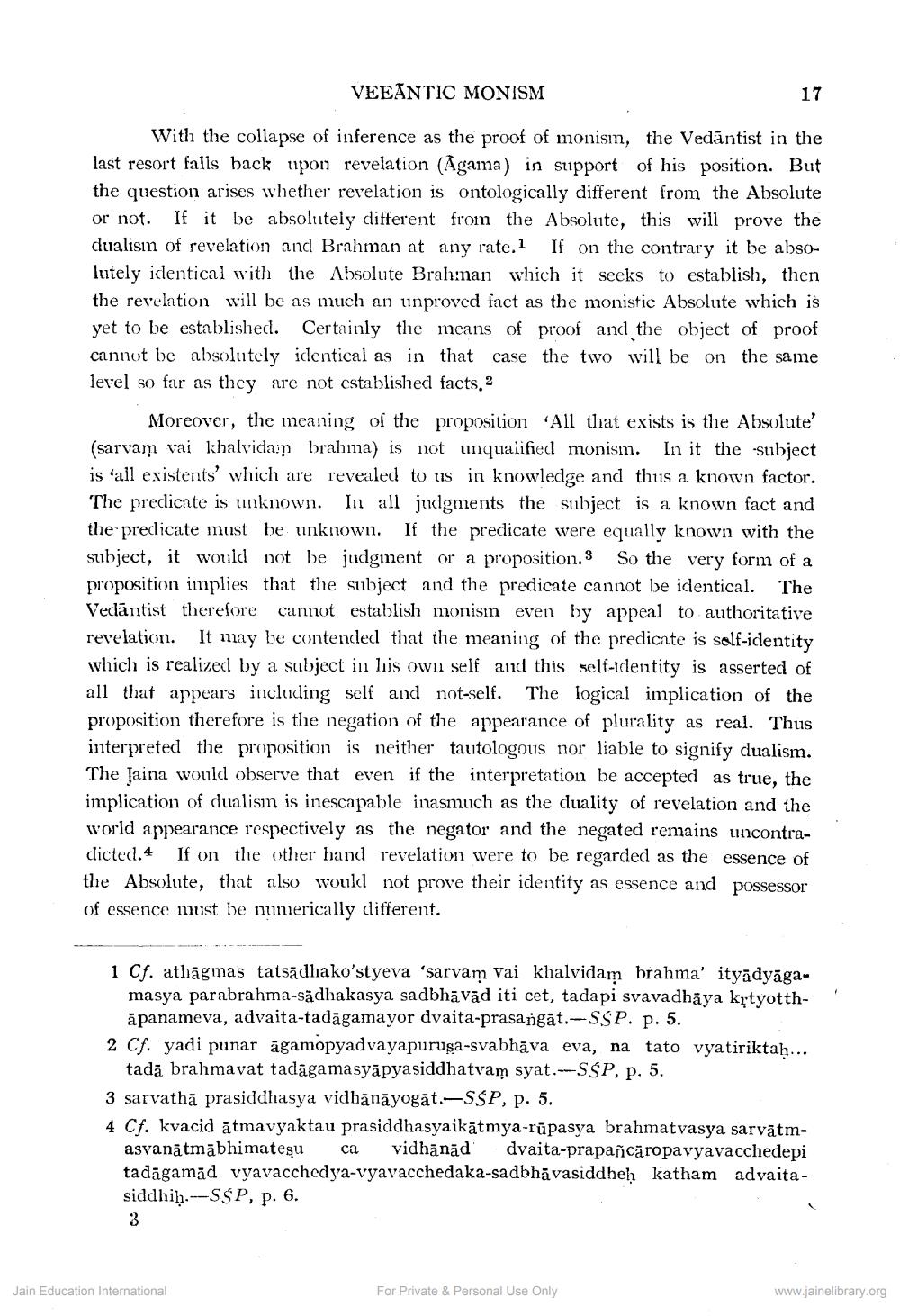________________
VEEANTIC MONISM
17
With the collapse of inference as the proof of monism, the Vedāntist in the last resort falls back upon revelation (Agama) in support of his position. But the question arises whether revelation is ontologically different from the Absolute or not. If it be absolutely different from the Absolute, this will prove the dualisin of revelation and Brahman at any rate.1 If on the contrary it be absolutely identical with the Absolute Brah:nan which it seeks to establish, then the revelation will be as much an unproved fact as the monistic Absolute which is yet to be established. Certainly the means of proof and the object of proof cannot be absolutely identical as in that case the two will be on the same level so far as they are not established facts. 2
Moreover, the ineaning of the proposition "All that exists is the Absolute' (sarvam vai khalvida p brahma) is not unqualified monism. In it the subject is 'all existents' which are revealed to us in knowledge and thus a known factor. The predicate is unknown. In all judgments the subject is a known fact and the predicate must be unknown. If the predicate were equally known with the subject, it would not be judgment or a proposition.3 So the very form of a proposition implies that the subject and the predicate cannot be identical. The Vedāntist therefore cannot establish monism even by appeal to authoritative revelation. It may be contended that the meaning of the predicate is self-identity which is realized by a subject in his own self and this self-identity is asserted of all that appears including self and not-self. The logical implication of the proposition therefore is the negation of the appearance of plurality as real. Thus interpreted the proposition is neither tautologous nor liable to signify dualism. The Jaina would observe that even if the interpretation be accepted as true, the implication of dualisin is inescapable inasmuch as the duality of revelation and the world appearance respectively as the negator and the negated remains uncontradicted.4 If on the other hand revelation were to be regarded as the essence of the Absolute, that also would not prove their identity as essence and possessor of essence must be numerically different.
1 Cf. athāgmas tatsadhako'styeva 'sarvam vai khalvidam brahma' ityadyāgamasya parabrahma-sadhakasya sadbhāvād iti cet, tadapi svavadhāya kątyotth
āpanameva, advaita-tadāgamayor dvaita-prasangät.-SSP. p. 5. 2 Cf. yadi punar agamopyadvayapurusa-svabhāva eva, na tato vyatiriktah...
tadā brahmavat tadāgamasyāpyasiddhatvam syat.--SŚP, p. 5. 3 sarvathā prasiddhasya vidhānāyogāt.-S$P, p. 5. 4 Cf. kvacid ātmavyaktau prasiddhasyaikātmya-rūpasya brahmatvasya sarvātm
asvanātmābhimategu ca vidhānād dvaita-prapancāropavyavacchedepi tadāgamád vyavacchedya-vyavacchedaka-sadbhāvasiddheh katham advaita - siddhiḥ.--S$P, p. 6.
Jain Education International
For Private & Personal Use Only
www.jainelibrary.org




